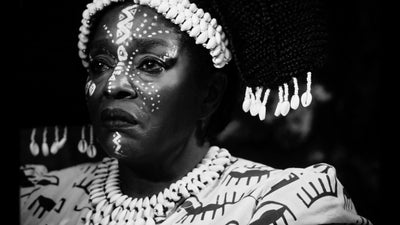The film Mami Wata is doing something different. Firstly, while many (well-made) films set on the African continent — at least those made by Africans themselves anyway — often take the time to show the epic range of colors of their surroundings, this film is in black and white. There is also no way of telling the exact time period it exists in either; its intention, one might argue, is to transcend time. And for that matter, Mami Wata transcends place too, contextualizing itself in the non-existent Iyi coastal village, which is supposed to be somewhere in West Africa. According to Nigerian writer and director C.J. Obasi, this effort was deliberate.
“The concept of Mami Wata is something that connects us in West Africa, and I wanted to tell a West African story, something that transcends more than just a Nigerian story,” he tells ESSENCE.
 Rita Edochie appears in a still from Mami Wata by C.J “Fiery” Obasi , an official selection of the World Cinema Dramatic Competition at the 2023 Sundance Film Festival. Courtesy of Sundance Institute.
Rita Edochie appears in a still from Mami Wata by C.J “Fiery” Obasi , an official selection of the World Cinema Dramatic Competition at the 2023 Sundance Film Festival. Courtesy of Sundance Institute.
The venerated water spirit Mami Wata is a powerful deity in many West and Central African ethnic groups as well as their diasporas throughout the Americas. In the film, Mama Efe (Rita Edochie), the leader in the village is also the mediator between her people and a goddess, asking for her to intercede on their behalf. Mama Efe however cannot force Mami Wata to do anything including heal children who have recently become ill, to the dismay of her daughter Zinwe (Uzoamaka Aniunoh). Consequently, Zinwe and Mama Efe’s adopted daughter/apprentice, Prisca (Evelyne Ily Juhen) sense that many of the villagers are becoming as doubtful of Mama Efe’s powers as they are of Mami Wata herself.
The skepticism of the villagers in the stunningly shot visuals that reimagines how African stories unfold on screen, is also unraveling a rarely depicted narrative — that of Africans being freethinking and cynical of their own age-old beliefs and traditions , andwithout interference from outsiders.
“During the development, it was very important to me that doubt, conflict — that it came from within. Because I think that’s what all of us are wrestling with,” Obasi says. “Because in order to arrive at some level of self-realization…it has to come from within.”
As Mama Efe’s time in Mami Wata as a leader looks to be up, as the Iyi community examine their beliefs in terms of their deity, as they witness and consider the introduction of non-Native medicines to save their children, as the structure of the entire community looks like it might alter for good, ultimately in his story, Obasi is asking pertinent questions of West Africans in particular, and Africans at large.
“What does our spirituality mean and where’s our place in today’s world? What does it even mean to be truly African?’ he says. “Does it mean to be hardcore traditional…or do we have to completely abandon everything that is [traditionally] African? Where is the balance?”
Mami Wata also has an unmissable Afro-feminist presence in it from how women center the narratives to how the deity herself is discussed and depicted — terrifying, marvelous, powerful. It’s a complex narrative that has sometimes been shut out due to bastardizations of how Africans have contextualized her story since the arrival of non-historically African religions and traditions. The film’s producer, Oge Obasi, was keen on her being seen in all her glory and complexity because she says the suppression of the deity is linked to the oppressions of African women since the beginning of unequal contact with non-Africans, pre-colonially.
“African women’s power had to be silenced for Africa to be dominated properly,” Oge says. “So, after generations and generations [of oppression], you begin to lose that power because you’re not passing it on anymore.”
Obasi agrees, noting that because Mami Wata is a water deity, she is considered amongst the most supreme in some ancient cosmologies. This, while not fully captured in the film in terms of her power relative to other deities is an important addendum to anyone who encounters stories of Mami Wata in this film and beyond.
“There is a commentary about Mami Wata being the originator of the universe…It is a very deliberate religious and political intentional act to take that away because the image of power…you have to realize…images and symbols control the world,” he says. “So, when you say that the deity that potentially created the world is a woman, that says something. And [she] has dark skin? That says something.”
TOPICS: Sundance Film FestivalThe post ‘Mami Wata’ Is A New Retelling Of An Old West African Story appeared first on Essence.


0 Commentaires